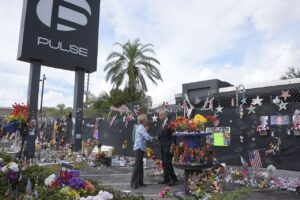
In the early hours of June 12, 2016, Omar Mateen entered a popular gay nightclub in Orlando, Florida, called Pulse, and opened fire on the patrons inside, beginning the terrifying ordeal that would continue for the next four hours.
A security guard attempted to intervene and exchanged shots with Mateen, but was outgunned and retreated to call for help. Local police received the first call about the gunshots at 2:02 a.m. from one of the victims inside and by 2:08 had arrived at the scene, entered the building, and began sending as many people out of the club to safety as possible. More shots were fired and at 2:20 another victim’s 911 call confirmed that Mateen was in one of two adjacent bathrooms with multiple hostages. Meanwhile, police continued to search and evacuate those hiding throughout the rest of the club. Mateen placed his own call to authorities at 2:35, in which he declared his allegiance to Abu Bakr al-Baghdadi and ISIS.
After this the event was declared a hostage situation, operations were turned over to SWAT, who attempted to negotiate for the next several hours until Mateen started making threats about detonating explosive devices nearby. At 5:02 SWAT began trying to blast through the exterior wall of the neighboring bathroom in order to extract additional survivors and obtain a more direct line to take out Mateen. However, they miscalculated and knocked a hole to the hallway between the two bathrooms instead. Alerted by the noise, Mateen shot three more hostages. Police respond by launching stun and flash grenades in the cleared bathroom to draw out Mateen. Mateen then entered the hallway and engaged police, who returned fire. Mateen was fatally hit at 5:17 and units declared him officially dead just before 6:00 a.m., finally bringing the harrowing standoff to a close.
All in all, 38 people died on site and 11 more after being taken to the hospital to make 49 victims total. The Pulse Nightclub Shooting became the deadliest mass shooting in U.S. history. Of those injured, the last victim was not released from the hospital until September.
Unfortunately, because he was shot on site and did not leave a manifesto, Mateen’s motives for targeting the nightclub may never be fully understood. The shooting was an act of terrorism in the name ISIS (though not one investigators believe coordinated by ISIS themselves), as Mateen made clear in his phone calls with the police; in addition to pledging his allegiance to the Islamic State. Back in 2013, Mateen was placed on the terrorist watchlist and investigated by the FBI for almost a year, after coworkers reported he had made several aggressive comments about having ties to multiple terrorist organizations, but found no evidence to suspect him of actual terrorist activity. They questioned Mateen again after another man that attended his mosque detonated a suicide bomb in Syria, but still found nothing.
Why Mateen chose Pulse, however, is still unclear. Because homosexuality is considered a sin by radical Islamists, many consider the shooting not just an attack on America, but a deliberate hate crime against LGBT people as well. Mateen’s ex-wife, family, and former coworkers have all attested to hearing Mateen make homophobic remarks in the past, further supporting this explanation. Curiously, though, multiple witnesses from that night and other club patrons identified Mateen as a frequent Pulse patron; still more claimed to have seen him on popular gay dating websites. This suggests Mateen may have targeted Pulse for a more personal reason rather than motives related to ISIS. Despite all of the concurring testimonies, investigators reportedly found nothing to confirm these claims were true, once again implying that those who died at Pulse were simply the unfortunate victims of a random and tragic act of domestic terrorism.
